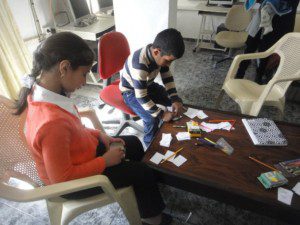Melissa Diamond and the rest of the team are still in Jenin, in the West Bank of the Palestinian territory for the next few months working on “The Jenin Autism Project,” part of “A Global Voice for Autism.” They are there to help parents learn about autism and Applied Behavior Analysis and help connect them to other autism resources as well as building their own supportive network. They are blogging their experiences here to share their efforts in figuring out how to best help children with autism in a part of the world where so little help is available. See the end of this post for links to prior posts on “The Jenin Autism Project.”
Editorial Note: This post really brought back a lot of memories. When you are parents to more than one child, and one of your children has autism, their relationship with their siblings is a glorious mix of frustrations, triumphs, difficulties and fierce protectiveness. And, above all – love. When my son was five and daughter two, we moved to Virginia and enrolled him in a private autism school. In our meetings with his team, as we wrote his IEP (individual education plan), we discussed the many things we wanted him to learn, his strengths, his challenges and how to best teach him and learn from him. One of my goals was to help him and my daughter build a better relationship. They were, at that point, living in two different worlds, and I needed to learn how to bring them to being brother and sister.
So we started sibling therapy, teaching my young daughter how to interact and play with her brother, how to keep after him and not get deterred when he ignored her. We taught Lil D to really see her, to hold hands with her when walking across the street, to engage in turn-taking games with her and to engage with her in whatever ways were comfortable for him. Those years spent in school and at home helping them forge a relationship together has helped our family in more ways than I can describe. I hope the siblings involved in the Jenin Autism Project can take what they are learning and use it to have stronger relationships with their autistic brothers and sisters. I hope these siblings know what rock stars they are.
By Melissa Diamond
Last week we gave the siblings in our sibling support program a challenge to spend 10 minutes a day playing with their brother or sister with autism and to come back this week and tell us what they learned. The results were impressive. Every child came back with a story of their time playing with their sibling. Some even applied the basic ABA principles we taught them last week during their play.
The children in our program still faced challenges when playing with their brothers and sisters, and they know that those challenges will not disappear overnight. But by using ABA, their knowledge of their sibling and their creativity, they are motivated to continue helping their siblings and strengthening their relationships.
Check out what some of them had to say:
Haya* (9) sibling of Abed (5)
“This week Abed and I spent time playing games, painting and playing in the garden together. While playing with him, I noticed that even though he does not talk, Abed is very clever. When my mother was getting ready to leave the house, she told us that she needed to get her scarf before she could leave. Abed heard her and went to find the scarf and brought it to her.
“One of the hardest things about playing with Abed is getting him to play with me. Sometimes I try to play with him but he walks away and goes to play by himself. When he does this, I try to get his attention again by playing things that he likes to play. This worked and he came back to play with me”
Adham* (14) sibling of Mohammad (5)
“Mohammad is still obsessed with my cell phone but this week I played catch with him, played soccer and helped him play with a remote-controlled car.”
“When I take my phone away from Mohammad he still cries until I give it back to him. Next week [After today’s group discussion] I am going to make him ask for it and am not going to give it to him when he cries. I want to be able to share my phone with Mohammad but I want us to take turns with it.
“You should know that Mohammad learns very quickly and has a great memory. I have a dot password on my phone and after watching me unlock my phone only ONCE he knows the password and remembers it every time!”
Taha* (9) sibling of Adnan (11)
“This week I learned that Adnan knows how to write and how to color so we practiced writing and coloring. We also played soccer, played with sand and played with trucks. When Adnan wanted to play with something this week, I made him say “I want that” in order to get it. I got him to ask for small cars, plastic trucks and play dough and only gave him these things when he asked for them.”
After the discussion, we helped the siblings create some more activities that they can play with their brothers and sisters with autism at home. First, we made “Memory” games where they can take turns trying to match cards in pairs. Later, we made “rain sticks” by filling water bottles with rice and beans and decorating them with stickers.
We finished the day by playing some games with the siblings that centered around the point that their brothers and siblings with autism may learn differently than they do. For the first game, one of our translators stood in the corner and gave instructions like “clap your hands” and “stand up” in a whisper. When the children said that they could not hear, we switched the game up and gave the directions in English. After the game we discussed how sensory challenges and difficulty with auditory learning might affect some individuals’ with autism and might make it difficult for them to participate in certain activities.
For the second game we had the children pair up and then brought one child from each partner into the next room. While their partners were out of hearing distance, we explained the rules of a Lego-building task to them and instructed them to go back in and explain the task to their partners without talking. After completing the task we had a group discussion about the strategies they used. All of the partners talked about visually demonstrating and using hand gestures to instruct their partners. They noted that these are strategies that they can also use to help their siblings if they are struggling with a task.
We ended the support group by challenging participants to spend time with their siblings every day this week and to continue using the strategies we discussed in order to work through the difficulties they might be having.
While we were having sibling support downstairs, the mothers went through a toilet training and life skills training and took a quiz about the skills they have learned so far. The mothers were looking forward to this training and said that they were very happy to have the knowledge to work on toilet training with their children at home.
Melissa is blogging about her experiences, which will be posted here and on her own blog. For more information, please check the blog and the website for A Global Voice for Autism.













